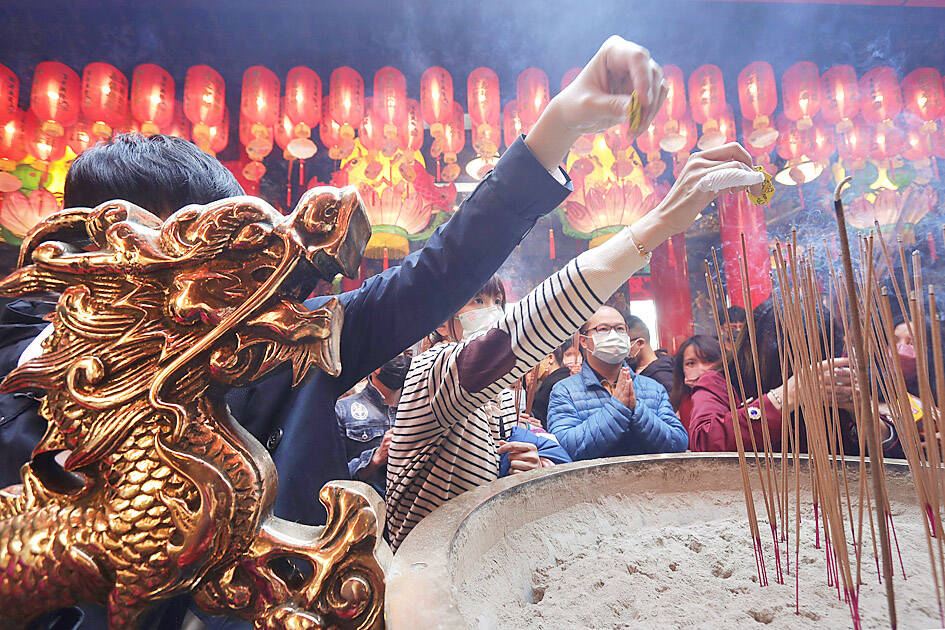China has been seeking to influence Taiwanese elections using its ties with local Matsu (媽祖) temples, academics said yesterday as they shared the results of their research published in Foreign Policy Analysis.
Liu Yu-hsi (劉裕皙), one of the authors of “In the Name of Mazu: The Use of Religion by China to Intervene in Taiwanese Elections,” said the international community has been increasingly aware of Russian and Chinese attempts to intervene in foreign elections through religion.
At a forum hosted by the Democratic Progressive Party, the associate professor at Shih Hsin University said that the Chinese Communist Party has sought to use its agents to influence small and medium-sized enterprises, those with low to middle incomes, and residents in central and southern Taiwan.

Photo: Chiang Ying-ying, AP
Such efforts began targeting local residents and young people in 2017, she said, citing Kaohsiung voting data from 2014, 2016, 2018 and 2020 to show that China had been using Matsu temples as a main channel to exert influence over Taiwanese elections.
Chinese agents use temples to contact members who do not have clear political leanings and seek to influence them through daily communications and by gradually feeding them disinformation, she said.
Boroughs with Matsu temples have been more prone to vote for pro-China leaning political parties in presidential elections — 2016 and 2020 — and estimates show that one temple exerts influence over an average of 925 votes, the research showed.
Not all Matsu temples have been “infiltrated,” and it depended on how they were run, Liu said, adding that if members were stable and did not need to visit China often, then they would not be as affected by China’s “united front” rhetoric.
Temples in rural areas were also less affected, the paper says.
Another author, Sher Chien-yuan (佘健源), a National Sun Yat-sen University associate professor, said that borough wardens believed to have been influenced by China had allegedly mobilized borough residents, resulting in overwhelming support for the Chinese Nationalist Party’s (KMT) anti-ractopamine pork referendum question: “Do you agree that a ban should be in place to prohibit the import of pork and pork products containing ractopamine?”
The article says that in boroughs in Taipei, New Taipei City, Taoyuan, Taichung and Kaohsiung with wardens suspected of having Chinese ties, 4.7 percent more residents voted for the referendum.
Also speaking at the forum about China, Taiwan Sport Forward Association executive director Liu Po-chun (劉柏君), who has a background in religious studies, said that communist parties do not believe in religion.
When China talks about religion, it often harbors ulterior motives, she said.

SECURITY: As China is ‘reshaping’ Hong Kong’s population, Taiwan must raise the eligibility threshold for applications from Hong Kongers, Chiu Chui-cheng said When Hong Kong and Macau citizens apply for residency in Taiwan, it would be under a new category that includes a “national security observation period,” Mainland Affairs Council (MAC) Minister Chiu Chui-cheng (邱垂正) said yesterday. President William Lai (賴清德) on March 13 announced 17 strategies to counter China’s aggression toward Taiwan, including incorporating national security considerations into the review process for residency applications from Hong Kong and Macau citizens. The situation in Hong Kong is constantly changing, Chiu said to media yesterday on the sidelines of the Taipei Technology Run hosted by the Taipei Neihu Technology Park Development Association. With

A US Marine Corps regiment equipped with Naval Strike Missiles (NSM) is set to participate in the upcoming Balikatan 25 exercise in the Luzon Strait, marking the system’s first-ever deployment in the Philippines. US and Philippine officials have separately confirmed that the Navy Marine Expeditionary Ship Interdiction System (NMESIS) — the mobile launch platform for the Naval Strike Missile — would take part in the joint exercise. The missiles are being deployed to “a strategic first island chain chokepoint” in the waters between Taiwan proper and the Philippines, US-based Naval News reported. “The Luzon Strait and Bashi Channel represent a critical access

CARROT AND STICK: While unrelenting in its military threats, China attracted nearly 40,000 Taiwanese to over 400 business events last year Nearly 40,000 Taiwanese last year joined industry events in China, such as conferences and trade fairs, supported by the Chinese government, a study showed yesterday, as Beijing ramps up a charm offensive toward Taipei alongside military pressure. China has long taken a carrot-and-stick approach to Taiwan, threatening it with the prospect of military action while reaching out to those it believes are amenable to Beijing’s point of view. Taiwanese security officials are wary of what they see as Beijing’s influence campaigns to sway public opinion after Taipei and Beijing gradually resumed travel links halted by the COVID-19 pandemic, but the scale of

Pope Francis is be laid to rest on Saturday after lying in state for three days in St Peter’s Basilica, where the faithful are expected to flock to pay their respects to history’s first Latin American pontiff. The cardinals met yesterday in the Vatican’s synod hall to chart the next steps before a conclave begins to choose Francis’ successor, as condolences poured in from around the world. According to current norms, the conclave must begin between May 5 and 10. The cardinals set the funeral for Saturday at 10am in St Peter’s Square, to be celebrated by the dean of the College